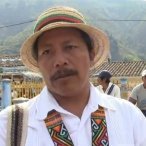English · Español

25 de marzo de 2013 | Entrevistas | Congreso Nacional para la Paz en Colombia | Anti-neoliberalismo | Derechos humanos | Luchadores sociales en riesgo
People’s Action
Interview with Feliciano Valencia, leader of the Indigenous Regional Council of Cauca (CRIC)
Descargar: MP3 (2.2 MB)
The social and armed conflict that has hit Colombia for the past five decades, has mainly affected the country’s rural population. The consequences of the conflict have spread among society. Indigenous communities have suffered structural violence.
At the closing of the Peace Congress held in the south-west of Colombia from March 15-17, the indigenous movement presented its main proposals to be put forward at the National Peace Congress to be held in April in the country’s capital, Bogota.
“The indigenous movement has put several issues on the agenda: first, that war needs to stop because it has already been 50 years and we cannot take any more of this, it is imperative”, said Feliciano Valencia, leader of the Indigenous Regional Council of Cauca (CRIC). In the interview with our correspondent in Colombia, Danilo Urrea, Valencia said that “the indigenous have been strengthening autonomy to develop our own governments, to organize and consolidate our own security bodies and territorial control bodies, and to join together with other processes and organizations fighting for peace in the country”.
In October 2012, media from all over the world broadcasted the indigenous uprisings in Cauca department at the events of the so called “Liberation of Mother Earth”. The indigenous of Cauca expelled the military forces and armed groups from the hills considered sacred by the communities. They also said these actions were peace acts, and that they were part of a proposal to have a country with social justice. The indigenous movement believes, according to Valencia, that “one of the conclusions is that we need to continue to be together in a national peace movement because we need to appropriate this process. What if nothing happens in Havana and the conflict continues? Are we going to leave things as they are, or are we capable of having some influence to force the main sides of the conflict to end war and let us build peace?”
Besides the tension with the people from the armed conflict, in some regions like the south-west of the country there are differences between the indigenous, the black and the peasant communities as a result of their different views in terms of land and territory. Valencia said that “we need to overcome the internal tensions”. “If we want to talk about peace we have to start by ourselves, i.e. to reach interethnic and intercultural agreements as the ones being put forward by CRIC, because we cannot continue with the confrontation while we talk about peace […]. Finally, we are saying that we need to take the peace issue outside Colombia and learn from other processes in the region, from other peoples, and even from other governments and see how they were able to overcome the inequalities and the structural problems”, he added.
While the Peace Congress was taking place, 84 people from the movement Rios Vivos were arrested on March 16 in Antioquia department for peacefully demonstrating against Hidroituango hydroelectric project. They tried to prosecute 12 of them for blocking a public road, which could lead to 4 years in prison under a law passed by former right-wing president Alvaro Uribe. The Peace Congress issued a statement to demand the immediate release of the people who were arrested and to secure the right to protest and freedom of speech. Valencia said that “what is happening, not only in Antioquia, is what is happening in many other regions when we decide to defend our territory. The environmentalists are not only defending territory, but we are also coming up with alternatives for a development model that respects nature and Mother Earth”. “That, of course, goes against the government’s interests, so they repress and criminalize our actions through a law of their own doing”.
In view of the risks of criminalization suffered by the people who defend the environment in Colombia “we need to come together and build alliances to see how we are going to protect ourselves to avoid being victims of the criminalization of the social protest”, said Valencia. “A proposal came out of here as to how to develop a peasant guard, a popular guard, a student guard, we might even think about an environmentalist guard. We need to do that to gain autonomy and self-control”, concluded the indigenous leader.
* Danilo Urrea is a member of CENSAT Agua Viva – Friends of the Earth Colombia
Photo: upublicaresiste.blogspot.com








